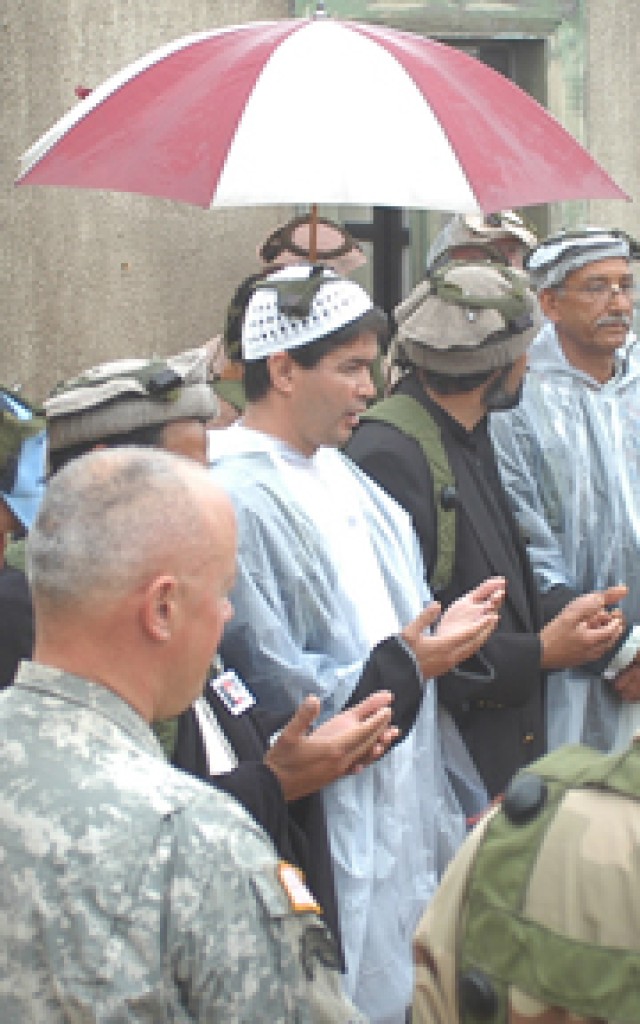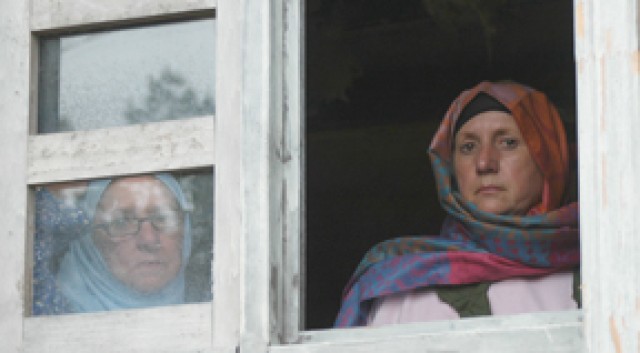FORT POLK, La. -- A group of Soldiers pull their armored Humvees into the mock village of Turani, Afghanistan, a village of mud huts, cautiously forming a security perimeter, eyeing a group of Afghans for suspicious behavior.
The Soldiers are assisting a local element of the Afghan National Army in providing security during a ribbon-cutting ceremony at a new medical clinic, April 23. The ceremony goes off without a hitch, but the Americans are constantly vigilant - the Taliban was active in this village only two days before the ceremony.
When a unit prepares to deploy to Iraq or Afghanistan, it usually stops off at a combat training center, either the National Training Center at Fort Irwin, Calif., or the Joint Readiness Training Center at Fort Polk.
Getting units acclimated to the culture of their destination is an important aspect of a rotation at a training center. JRTC features miles of roads where a simulated improvised explosive device may go off at any time, and an ambush may be waiting around every bend.
There are also numerous villages, built like the best Hollywood sets, which cause even the most skeptical Soldiers to forget they are in Louisiana. The ribbon-cutting scenario was one of the final assessments for the 1st Brigade Combat Team, 4th Infantry Division's, April rotation at JRTC, but by all appearances it could have been in Afghanistan. The brigade is stationed at Fort Carson, Colo.
Roleplayers are a key component to any rotation at JTRC - they bring life to the villages and authentic stress to urban battles. The roleplaying community includes cultural roleplayers - natives of Iraq and Afghanistan - and American roleplayers.
When they aren't actively engaged with rotational training units, or RTUs, the American roleplayers work on their impressions, learning Afghan and Iraqi dialects and mannerisms. The cultural roleplayers have a key part in training the Americans, but they also spend more time interacting directly with the RTUs. Turani boasts 15 cultural roleplayers, 39 American roleplayers and two group leaders.
Vickey Gibson is one of the group leaders - she has been roleplaying at JRTC for four years. Before that, she spent two years in Iraq supervising Iraqi workers in a laundry facility on a forward operating base. That is where she started to develop an appreciation for the Iraqi way of life. "When I first went over there, I didn't pay a lot of attention to the culture," she said. "But I started to get interested in my workers and their families and culture. I loved Iraqi cooking. Most of the time I ate with the workers and didn't bother going to the dining facility."
As a group leader, Gibson does the paperwork and coordination with JRTC trainer/mentors, who assess the RTUs and provide daily advice and training. She receives scenarios and explains them to the rest of the village - and submits an after action review to her supervisor when the scenario is over.
"When a rotation begins, each village has a status - either green (friendly), amber (neutral) or red (hostile)," Gibson explained. "We may be for the coalition and against the Taliban, or we could be neutral to both. The Taliban came in to our village two nights ago, executed some of the police and used a few of our women as shields trying to get the RTU to come out of their FOB. That turned us against the Taliban. It didn't turn us against the RTU, but we're not happy with them because they didn't come out to help us."
Roleplayers spend their downtime learning from each other. Celeste Cobb retired from the military and has been roleplaying for 10 years. "It's important to work with the cultural roleplayers because they bring realistic training to the Soldiers," she said. "They give us guidelines on how to act when the Soldiers come through."
The Afghans enjoy sharing their culture, too. Judin Zadran was born in Afghanistan and came to the U.S. in 2001. He became a U.S. citizen in 2007 and has played the village cleric three times in Turani.
"I lived in Afghanistan for 17 years," he said. "I still remember about our culture and people. I want to give the U.S. military a broad view of the people of Afghanistan. I have a lot of friends among the roleplayers. The language barrier is a big factor, but every morning we work with them and teach them some Pashtu and Dari words. They are interested - they want to learn - I like that."
"I love working with these guys," said Ahmed Mohammad Nadir, who moved to the U.S. in 2005. "They're all pretty cool. We try to share our experiences with them, so they can use it later in their roleplaying."
The roleplaying community enjoys building robust relationships and cultural bridges. "When we tell them how good their cooking is, you can see them swell with pride," Gibson said. "Next rotation they said they would cook for the whole village."
"We are like a family out here, we learn a lot from Americans too," said Nadir. "There are a lot of things I didn't know - it goes two ways."
JTRC has improved dramatically in the past few years, according to Cobb. She makes a bakery analogy: "Someone might make cakes for the fun of eating them, but JRTC is now the equivalent of a wedding cake decorator," she said.
"It's no longer just a simple cake - it's designed for a wedding. It has tiers, and complicated details. When I first got here we just put together random scenarios. Today, RTUs can get the impression that they are actually in Afghanistan. We speak, act and dress like Afghans. We have goats, chickens and gardens."
Because some of the units coming through now have already been deployed, JRTC has progressed the training beyond cultural fundamentals to the political realm. "Most Soldiers know not to touch the women and to be careful about what they say in meetings, so we don't even bother teaching them about that," Cobb said.
The roleplayers understand how important their job is. "When I think about why we're here, I know this is a job and it's not real, but it could save someone's life," Gibson said.
"We spend a lot of hours out here and it's hot, cold and wet. If it brings one Soldier back home, that's why we're here. They're fighting to allow us to have what we have, so this is the least we can do. I like to laugh and have a good time, but this is serious business - I want to see all of our Soldiers come back. We usually root for the Taliban during scenarios. It's not because we favor them over the RTU, but the harder the opposing force can make it on them here, the easier it will be when they deploy."
"This job makes me happy to be an American," Cobb said. "It prompts me to teach my children about other cultures and explain how blessed they are because of the freedoms they enjoy. We want the Soldiers to make their mistakes here so they can come home with all their limbs, a sound mind and a sense of accomplishment."
For the cultural roleplayers, the job has an added element of danger. Interpreters have been targeted by extremists in Iraq because of their work with coalition forces. "It's risky work, but nothing comes easily," said Zadran. "We should be ready to sacrifice to obtain something."
Zadran said he looks forward to peace in his homeland. "We have made progress in Iraq, and we see the results. Now I'm looking forward to seeing the same kind of progress in Afghanistan. As long as the Army needs my assistance, I will provide help. The U.S. servicemembers are like my brothers and sisters. I was separated from my wife for seven years because of the war, so I know how they feel."
"I love this and will continue as long as I can," echoed Nadir. "I can't stand on the side and not do something for Afghanistan. This is the little bit I can do to keep U.S. Soldiers from being killed or killing an innocent person."
Nadir plans on deploying to Afghanistan as an interpreter soon. "I know it's a dangerous job, and I have a wife and kids who will stay here when I go to Afghanistan, but I want to know that I've done something I can be proud of," he said. "Hopefully in the near future, the problem in Afghanistan will be solved and all the troops will return home safely. My wish is that there would be stability in Afghanistan so I can go see the rest of my family."
After the excitement of the ribbon-cutting ceremony died down, the Soldiers mounted their vehicles and returned to their FOB, one step closer to deployment. Gibson, Cobb, Zadran and Nadir withdrew into Turani, confident that the RTU had learned some lessons - and began to prepare for the next rotation.




Social Sharing